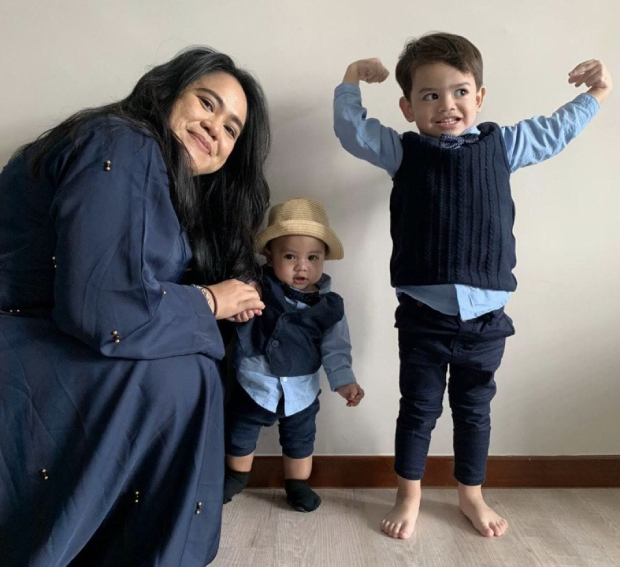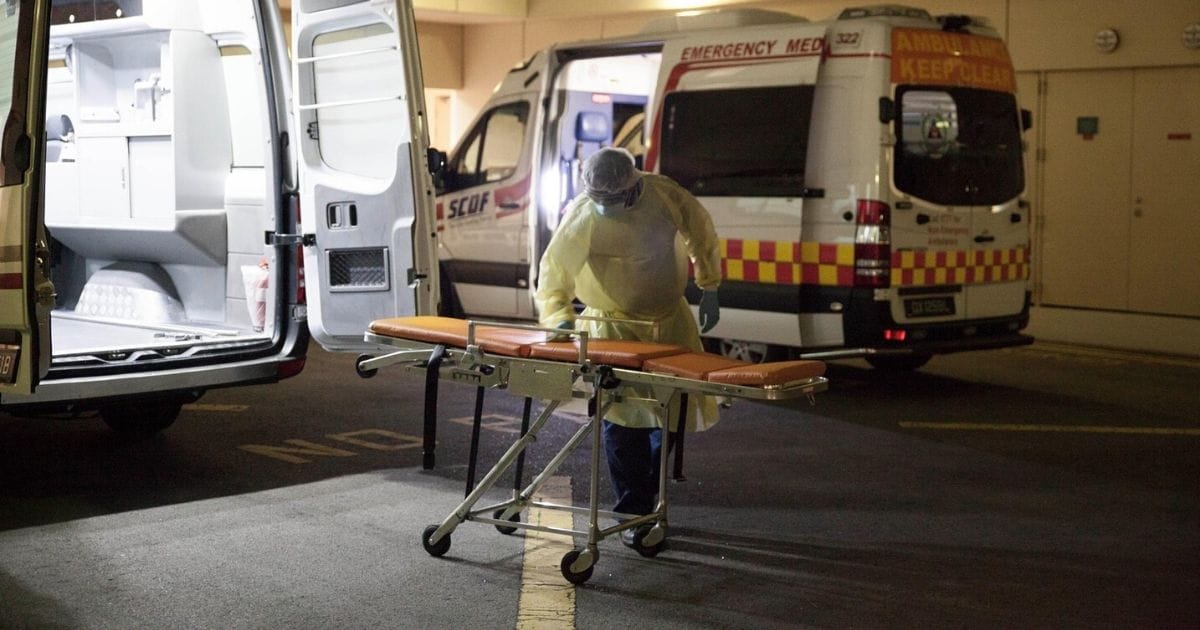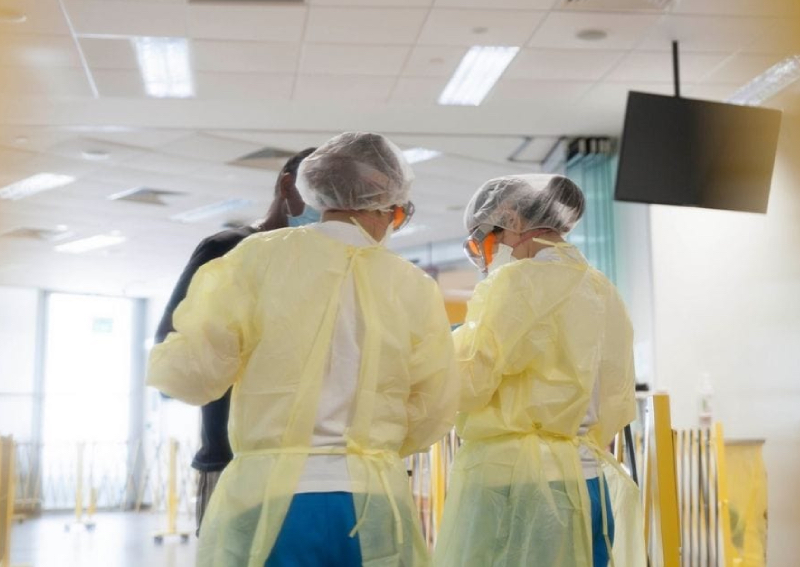Covid-19: For mothers working in the frontlines, it's a lot like a double duty


As we continue our battle with Covid-19, we see healthcare workers working tirelessly to attend to patients, making the ultimate sacrifice by risking the danger of getting the disease just to provide support to those in great need of medical care and assistance during this pandemic.
But many front line workers carry an extra load, and often with little praise. Some of them are the mothers in the frontlines who put themselves in the path of the virus every day while also balancing the needs of their own families at home.
We spoke with two nurses on what it means to be mothers in the frontlines during the coronavirus pandemic. We learned about what they have to give in efforts to fight against the virus and keep us all safe during this time.
When Nurse Juwita Ramlan found out that she was going to be deployed to the National Centre For Infectious Diseases (NCID), she knew she had to step up and make some sacrifices in order to fulfil a sworn job.
“When I was told that I will be deployed to the infectious diseases ward, my initial thought was maybe I should stay away from my kids.
"But being away from them for many hours in a day is already something very difficult for me,” Nurse Juwita, who is a mum to three kids with the youngest being only eight months old, told me during a video call while she was getting ready to go to work that day.
Health workers follow a strict procedure in ensuring their safety as well as the safety of their patients.
Each one would wear personal protective equipment (PPE), with the help of another colleague, to ensure that they don’t contract the virus when they tend to patients positive of Covid-19.

“Every day, going home after work, I make sure I’m clean, I wash up before getting near any outside of the hospital.
"As nurses, and for me personally, because I have a family at home, we don’t take safety procedures and precautions lightly.”
Such is not the case for Nurse Unica Gutierrez. The single mother left home in the Philippines to work as a nurse here in Singapore.
She left her 8-year-old child in the care of her parents and worked overseas in hopes to provide them with a better life. She is now one of the mothers in the frontline fighting Singapore’s battle against the virus pandemic.

Despite how hectic their schedules are, Nurse Unica said it is important for her to make sure she makes time to call her child.
“Every opportunity I get to call her, I do. I’m grateful that we are able to take breaks and I get to go on a video call and check on my daughter,” she said, adding that keeping in touch with her child helps her fight the mental and physical exhaustion of her everyday job.
But of course, there are times the sadness brought about by being away from her child during this extraordinary time we face takes over her.
Nurse Unica said it is especially difficult when she thinks about how unpredictable this pandemic is, and the idea of not knowing when it will end.
She has not seen her child since coming back from the Philippines four months ago.
[[nid:489397]]
“It is the longest that I have not seen her,” she said, noting one of her motivations of going to work every day is knowing that the sooner we overcome the virus pandemic, the sooner she can go back home.
However, the Covid-19 pandemic means uncertainty — on so many different levels — for a lot of people.
For patients, it’s like being suspended between life and death because the battle is so unpredictable, no one knows how each day would end.
Recalling a conversation with a patient whose battle with the virus gets more difficult by the day, Nurse Unica said: “When they tell you about how much they are suffering, especially those who are in the verge of giving up, you feel this intense level of heartbreak.
"You can feel how anxious they are when they ask if you think they will ever get better or if they will even survive. ‘Will I still be able to go back to my family?’ a patient who was in critical condition asked me before.
“When you hear these questions, you can’t help feel emotional. But at the same time, you know you have to be strong because they get their energy from you, too.
"So it makes you want to try everything you can to provide them with even the slightest of comfort.”
But not everyone was lucky to make it through. As of June 11, there have been 25 fatalities related to the virus.

Nurse Unica has tended to many patients throughout this whole pandemic and have also met those who unfortunately lost their battle against Covid-19.
She said she was able to speak with one of the patients who passed on, just moments before the patient succumbed to the virus.
“‘Just let me go,’ he told me, days before the patient passed on. [The patient] was telling us he just wants to [pass on] because he feels like he has suffered enough.”
“It was very sad. Their families couldn’t even be there with them physically during their final moments. There were no goodbye hugs, no goodbye kisses, it was extremely heartbreaking.”
Nurse Unica said: "These are days that are extra difficult. But there are days that are extra fulfilling.”
She said one of the things that help them, especially the mothers in the frontlines, get through those moments is seeing more patients get better, and eventually, seeing them get discharged.

There are no words enough to express our appreciation for the bravery, efforts, sacrifice and service our medical workers on the frontlines of the Covid-19 outbreak here.
The pandemic has brought together people from across the nation to support those who go out to help us get closer to overcoming this challenging time.
[[nid:488453]]
From clapping from our balconies to singing together as a nation, there have been several ways Singaporeans have expressed the neverending gratitude and support for our frontline workers.
“I am very thankful for all the support people have given us in the frontlines.
"We never expected that the whole nation would actually come together to cheer us on and give us support.
"It’s heartwarming.
"The claps, the songs, the messages of encouragement are energy-boosters for us,” she added.
Meanwhile, Nurse Juwita said she has never felt more proud to be a healthcare worker, and that the support from the community “remind us why we are on the front lines.”
“I have always been proud of being a nurse, my job has always been something of pride to me. But I think now, it gives me more confidence especially how people have changed their perceptions of us nurses.
"Before, we were just “caregivers” and don’t see us as important members of the healthcare system. Now, people acknowledge us, they praise us, cheer for us.
"That gives me confidence and I think I have become more passionate about my job, and confident as a nurse,” she said.
However, despite the many efforts from the community to express support and gratitude to front line workers and those in the essential services sector, there were still instances where they suffer from abuse and discrimination.
[[nid:488674]]
Just in May, a nurse was reported to have been constantly harassed by his neighbour because of the nature of his work.
It even came to a point where he and his child was sprayed with a disinfectant on some occasions, on top of verbal abuse such as being called “virus” and other nasty things.
A police report has been filed since.
This is not the only instance where healthcare workers faced discrimination since the beginning of the pandemic here.
Some nurses experienced being shunned at food establishments and ostracised simply for wearing their uniforms.
Despite this, however, most nurses theAsianparent spoke with said no matter how exhausting their job is, which also comes with the extra burden brought on by being away from their kids, or not being able to hug and kiss them even when getting home, there is not a day when they just wanna throw in the towel.
“Caring for Covid-19 patients in the front lines has been a test to our commitment to our duties as medical workers. Each and every one of us in the health care sector plays an important role in fighting this battle,” Nurse Juwita said.
While we may be far winning the battle against this pandemic, our frontline workers remain hopeful.
“It may be a cliche to say but this, too, shall pass,” Nurse Unica said.
“Let us work together in keeping Singapore safe. Stay home, stay with your loved ones at home and take this opportunity to be closer to them, have quality time with them.”
Both mums look forward to overcoming this tough period and finally go back to the “normal” life they have at home.
[[nid:484577]]
“The main motivation for me is that I want my kids to live life normally. I want them to be able to go out, have fun, experience new things as we normally would,” Nurse Juwita said.
“If we work hard, and fight this pandemic, we can eventually triumph over and we will then be able to go back, little by little, to our normal lives — albeit the new normal — as much as possible.”
Meanwhile, Nurse Unica said what she looks forward to the most is being able to go back home and be with her daughter.
And as Singapore slowly reopens after the circuit breaker period, she said: “Let’s support each other in this difficult time because we play such an important role in helping the country get through this.
"Let’s keep fighting this virus — observe safe measure, let’s do our part to prevent further spread — so we can all go home safely to our families.”
For the latest updates on the coronavirus, visit here.
This article was first published in theAsianparent.